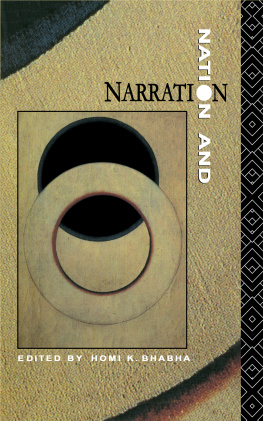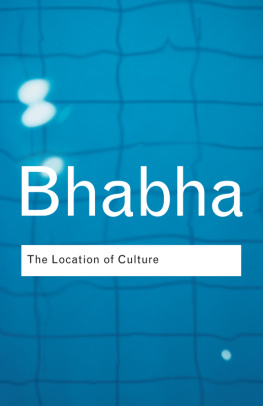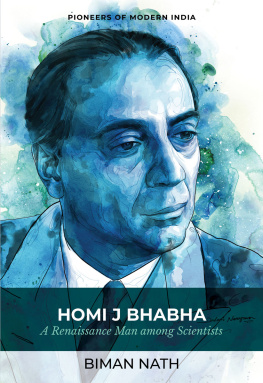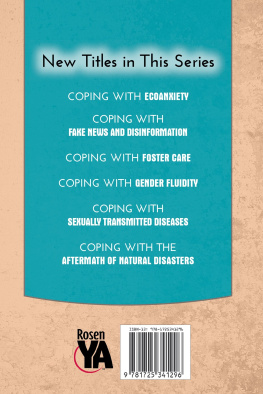Nation and Narration
edited by
Homi K. Bhabha
Nation and Narration
First published 1990
by Routledge
2 Park Square, Milton Park, Abingdon, Oxon, OX14 4RN
Simultaneously published in the USA and Canada
by Routledge
270 Madison Ave, New York NY 10016
Reprinted 1993, 1994, 1995, 1999 (twice), 2000,2002(twice),2003,2004
Transferred to Digital Printing 2005
Routledge is an imprint of the Taylor & Francis Group
The collection as a whole 1990 Routledge. The individual contributions 1990 the respective authors
Typeset in 10/11 Bem by Mayhew Typesetting, Bristol
All rights reserved. No part of this book may be reprinted or reproduced or utilized in any form or by any electronic, mechanical, or other means, now known or hereafter invented, including photocopying and recording, or in any information storage or retrieval system, without permission in writing from the publishers.
British Library Cataloguing in Publication Data
A catalogue record for this book is available from the British Library
Library of Congress Cataloguing in Publication Data
A catalogue record for this book is available from the Library of Congress
ISBN 0-415-01483-2
ISBN 0-415-01482-4 (hbk)
Contents
| Homi K. Bhabha |
| Ernest Renan |
| Martin Thom |
| Timothy Brennan |
| Doris Sommer |
| Sneja Gunew |
| Geoffrey Bennington |
| Simon During |
| John Barrell |
| David Simpson |
| Rachel Bowlby |
| Bruce Robbins |
| James Snead |
| Francis Mulhern |
| Gillian Beer |
| Homi K. Bhabha |
John Barrell is Professor of English in the School of English and American Studies at the University of Sussex.
Gillian Beer is Professor of Literature and Narrative at the University of Cambridge and a Fellow of Girton College, Cambridge. Her publications include Darwin's Plots (1983), George Eliot (1986), and Arguing with the Past (1989).
Geoffrey Bennington is Senior Lecturer in French at Sussex University. He is author of Sententiousness and the Novel (1985), Lyotard: Writing the Event (1988), and of forthcoming books in French on Rousseau and Derrida
Homi Bhabha is a lecturer in English at the University of Sussex. His collection of essays, The Location of Culture, is to be published by Routledge.
Rachel Bowlby teaches English at Sussex University. She is author of Just Looking (1985) on femininity, consumerism, and the novel, and Virginia Woolf: Feminist Destinations (1988).
Timothy Brennan currently teaches English and Comparative Literature at Purdue University and is a visiting professor at the University of Michigan. His publications include Salman Rushdie and the Third World (1989).
Simon During lectures in English at the University of Melbourne.
Sneja Gunew teaches in Literary Studies at Deakin University, Victoria, Australia. She has edited Displacements: Migrant Storytellers, Displacements 2: Multicultural Storytellers, and co-edited Beyond the Echo: Multicultural Women's Writing and Telling Ways: Australian Women's Experimental Writing.
Francis Mulhern teaches at Middlesex Polytechnic in north London. His publications include The Moment of 'Scrutiny'.
Bruce Robbins maintains a professional affiliation with the English Department of Rutgers University. He is the editor of Intellectuals; Aesthetics, Politics, Academics (forthcoming).
David Simpson is Professor of English at the University of Colorado, Boulder. His most recent books are The Politics of American English, 1776-1850 (1986) and Wordsworth's Historical Imagination: The Poetry of Displacement (1987).
James Snead was, until his death in the spring of 1989, Associate Professor of English and Comparative Literature at the University of Pittsburgh. His publications include Figures of Division: William Faulkner's Major Novels (1987).
Dons Sommer , Professor of Romance Languages and Women's and Gender Studies at Amherst College, Massachusetts, has published on a variety of Latin American writers, and on Walt Whitman. She is also the author of One Master for Another: Populism as Patriarchal Rhetoric in Dominican Novels (1983).
Martin Tfaom is a translator and freelance writer, working at present on Republics, Nations and Tribes: The Ancient City and the Modern World, a study to be published by Verso.
My greatest debt is to my contributors whose response to an unusual idea was both creative and collaborative. There are others, less visible, who have made this book possible. The lively participation of students at Sussex University in my Novel and Nation seminar convinced me of the need for a volume of this nature. My colleagues at Sussex provide the kind of support and stimulation that is not easily found. Without the enthusiasm and advice of Janice Price at Routledge this project would never have got off the ground. On her own turf she combines the bookmaker's racy instinct for what might be true but untried, with a rigorous determination to get it right. My editor Jane Armstrong was alive to the many possibilities of this volume and her opinion has been invaluable. Sarah Pearsall and Giuliana Baracco dealt with the production process in a way that was patient and forgiving. Above all I should like to thank James Donald, Stephen Feuchtwang and Robert Young for having listened and talked and read with such commitment that they turned my task into a common pursuit. James and Robert are editors' editors and they have generously contributed to 'cleaning up' the manuscript. Jacqueline Bhabha's work on immigration and refugee law emphasized the historical perspective of the diasporic and the homeless on the nation's story.
Amongst those of us who have shared in making this book, Jamie Snead has a special place that must now remain empty. At short notice, and in adverse circumstances, he agreed to write his essay. He sent it to me, shortly before he died of a long illness that he had kept private. It was then that I appreciated his true generosity. While honouring my deadline, Jamie was desperately involved in his own tragic race against time.
Homi K. Bhabha
1
Introduction: narrating the nation
Homi K. Bhabha
Nations, like narratives, lose their origins in the myths of time and only fully realize their horizons in the mind's eye. Such an image of the nation or narration might seem impossibly romantic and excessively metaphorical, but it is from those traditions of political thought and literary language that the nation emerges as a powerful historical idea in the west. An idea whose cultural compulsion lies in the impossible unity of the nation as a symbolic force. This is not to deny the attempt by nationalist discourses persistently to produce the idea of the nation as a continuous narrative of national progress, the narcissism of self-generation, the primeval present of the Volk. Nor have such political ideas been definitively superseded by those new realities of internationalism, multinationalism, or even 'late capitalism', once we acknowledge that the rhetoric of these global terms is most often underwritten in that grim prose of power that each nation can wield within its own sphere of influence. What I want to emphasize in that large and liminal image of the nation with which I began is a particular ambivalence that haunts the idea of the nation, the language of those who write of it and the lives of those who live it. It is an ambivalence that emerges from a growing awareness that, despite the certainty with which historians speak of the 'origins' of nation as a sign of the 'modernity' of society, the cultural temporality of the nation inscribes a much more transitional social reality. Benedict Anderson, whose Imagined Communities significantly paved the way for this book, expresses the nation's ambivalent emergence with great clarity:













